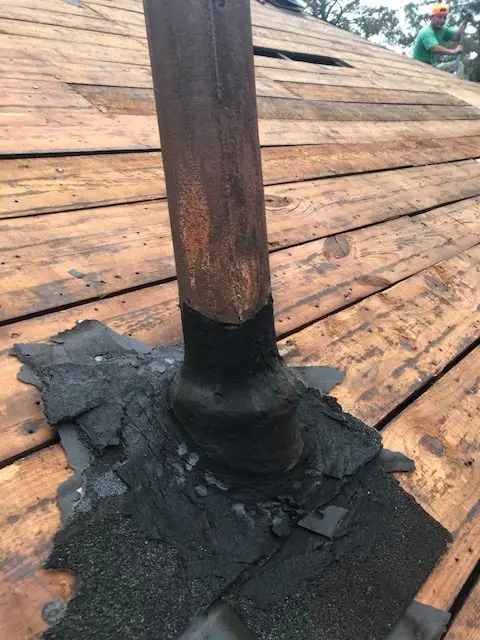Have you ever wondered why roof pipe collars leak? In today’s blog, we are going to share the details of that very problem and the solution.
Roof Vent Pipes
The overwhelming majority of residential roofs have at least 1, or several vent pipes protruding through the roof. These vent pipes serve as conduits to allow gas and/or air to escape through the roof. The pipes, originating in kitchens and bathrooms, transport the gas and/or air without having to be turned on or tended to. Because of this, and the fact that most of these pipes are located on the backside of residential roofs, most homeowners don’t think twice about these pipes sticking through their roof. So, they go unnoticed; unnoticed, until a roof leak develops.
The Pros and Cons of Different Roof Pipe Collars
Undoubtedly, one of the most common types of roof leaks is leaky roof pipes. The most common cause of a leaking vent pipe occurs at the collar surrounding the base of the pipe. The base of the vent is usually aluminum or galvanized steel, but the collar, or gasket, is usually made of rubber or plastic. The reason pipe penetrations leak is two-fold – #1, many pipes collars are not made to last as long as the shingles that surround them; #2, the roofers don’t understand how to properly shingle and seal a pipe collar. Any time an obstruction penetrates a roof, it’s imperative that the right material is used and that the roofers know how to properly roof around it.
The most common types of roof pipe collars are made of either plastic, lead, or galvanized steel. Plastic pipe collars, especially in the Alabama heat, tend to dry rot and break down prematurely. Plastic roof pipe collars are the cheapest for the roofer (whether he passes the savings to the homeowner is uncertain), thus are the most common collar used around pipe penetrations on shingle roofs. A properly installed plastic pipe collar can last 10-15 years. However, since plastic is the cheapest material for a pipe collar, they tend to attract less than reputable roofers, which means workmanship is usually sub-standard causing the pipe collar to never reach its optimal lifespan.
Lead pipe collars, if properly installed, are always a good choice. Lead is a durable yet pliable material in roof applications, hence the long-term use of lead pipe collars. But squirrels love to eat lead, and the state of Alabama has a lot of squirrels. When squirrels chew on the lead, it comprises the pipe collar creating leaks inside the house. Of course, if you don’t have squirrels that every climb on your roof, a lead pipe collar can be a good choice.
In our experience, galvanized steel is the only viable, long-term solution to flashing around pipe penetrations. Galvanized steel is rot-resistant, animals don’t bother it, and is paintable (painting pipes gives the roof a nice finished look). To avoid costly leaks and repairs, we use 1 of 2 kinds of pipe flashings on our residential shingle roofs. For our Standard Roof System, we use IPS Flashings with a galvanized base and flexible elastomeric collar. These collars come in 2 sizes (3/1″ of 4/1″) and are made to custom fit each pipe penetration. For our Ultimate Roof System, we use The Ultimate Pipe Flashing System with a wider, marine-grade stainless steel base and silicone collar. These collars come in 5 sizes (1 1/4″, 1 1/2″, 2″, 3″, and 4″). The Ultimate Pipe Collar provides a lifetime precision watertight seal with its ultra-pure silicone collar and PVC compression boot. All pipes collars installed on our roof systems are installed with a Storm Guard “target” under the shingles and fastened to the roof deck with heavy gauge metal screws.
The Importance of Being Proactive
Leaks around pipes collars often go undetected. The roof leak is usually never a major one but it does allow rainwater to enter the attic space. If the attic is properly insulated, the insulation will absorb the water, completely drying before the next rain. This cycle will go on and on until the plywood decking surrounding the pipe collar rots. However, these small leaks work like compound interest, if you leave it alone long enough, the monetary value will be huge.
If you believe you have a problem with roof pipe collars leaking into your home or business, or if you believe you have any kind of roof leak happening at all, it is better to be proactive in addressing the leak. Slow small leaks over time can end up costing lots of money in water damage. Guyette roofing is ready to help. Contact us today for a free estimate!

